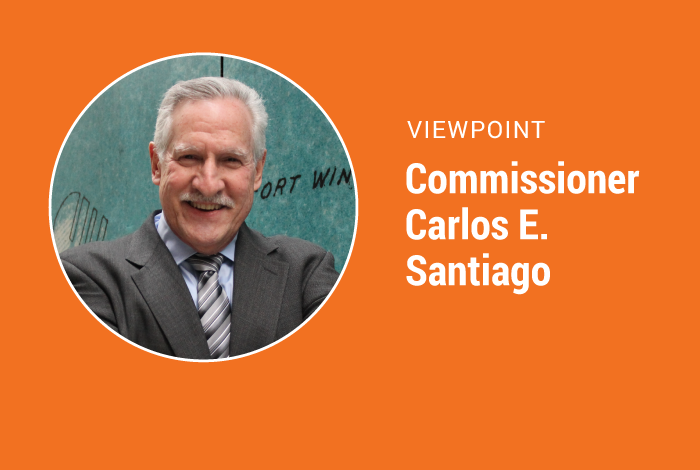
Commissioner Carlos E. Santiago
January 13, 2019
As a relative newcomer to Massachusetts I am often struck by the Commonwealth’s fixation with “firsts.” From the earliest Puritan quests for religious freedom to more contemporary advances in universal health care coverage and LGBTQ marriage rights, one sees in state history both a steely determination to make social progress as well as a collective desire to serve as a beacon for advancement.
These are good impulses. Similarly, in our higher education sector, we point with pride to Massachusetts’ longstanding status as the state with the highest proportion of postsecondary degree-holders. This is not just a matter of bragging rights, but a means of favorably positioning our innovation economy in the global competition for jobs, industry, and talent. Marketing the state as an intellectual powerhouse has yielded great dividends over the years.
However, we in higher education cannot just rest on our laurels. The Northeast is facing significant demographic shifts that imperil our ability to continue to fuel our innovation economy. Population growth has slowed considerably, and the aging of our population will result in significant numbers of retirements in the immediate future.
That’s why the Board of Higher Education’s December 11th vote to make equity the “top statewide policy and performance priority” for public higher education was nothing short of historic. Based on a thorough review of available data, including alarming projections of continued enrollment declines through at least the 2030s, the BHE concluded that a focus on college success and degree attainment for traditionally underserved populations was a critical way to maintain the state’s status as a national higher education leader.
The BHE’s vision statement for this new strategic framework must kickstart DHE and campus efforts in 2019 to measure campus and system performance and “promote initiatives and policies that collectively expand success for residents and for our economy and society.”
“That’s why the Board of Higher Education's December 11th vote to make equity the "top statewide policy and performance priority" for public higher education was nothing short of historic.”
Our first task will be to engage all three segments of our system—community colleges, state universities and UMass—in development of a strategic plan to achieve our equity goals. This work will be enhanced by DHE’s powerful new Performance Measurement Platform, launching this spring. The system’s ability to continuously monitor performance at our public institutions will help us:
Our public higher education community will also want to closely consider equity goals for individual programs as well as broader policy initiatives. For example, DHE-funded 100 Males to College programs in Springfield and Framingham send more than 90% of their Latino and African American male graduates to college. But how large do these cohorts need to be in order to make a dent in the statewide gaps we see in degree attainment? That same question should also be asked about larger-scale initiatives such as early college.
Meanwhile, Massachusetts has the fastest-growing public college costs in the U.S., according to a recent report by the New England Board of Higher Education, not to mention high housing and child care expenses that hit students hard. Despite this, Massachusetts ranks 25th in the amount of aid allocated to full-time equivalent students. Are we prepared to examine systemic funding and aid inequities, or only inequities directly related to academic achievement?
To meet our objectives, Board Chair Chris Gabrieli observed that “We’re all going to have to work and act differently.” As a system of public institutions, we are prioritizing collaboration over competition to better meet the needs of the Commonwealth. I would add that our higher education community must also proceed with a sense of urgency. All indicators suggest that higher education must pursue the equity agenda now, not down the road. My hope is that a state known for being first will also become the state recognized for doing the most to address inequity.